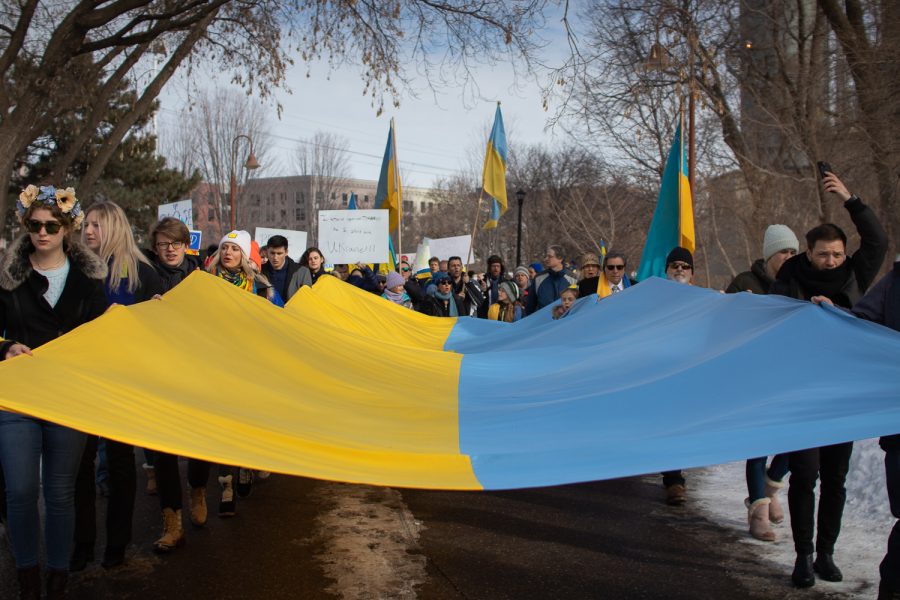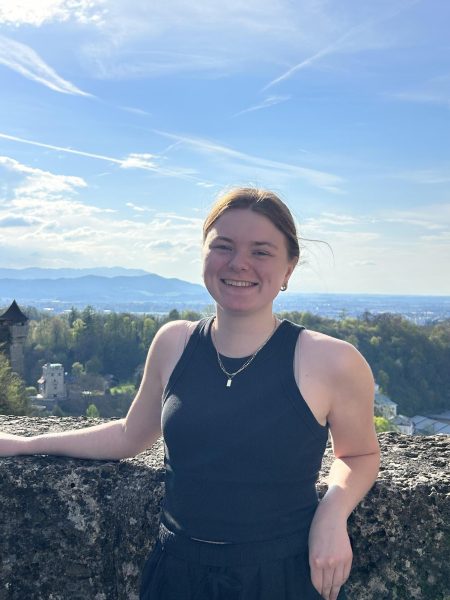Mac hosts discussion on war in Ukraine
March 31, 2022
Amidst continuing Russia’s invasion of Ukraine, the Macalester community met on Thursday, March 24 with the student group Mac4Ukraine for a group discussion in Weyerhaeuser to further understand the conflict and its larger context.
Weeks after the start of the conflict, Russia has not captured the capital of Ukraine yet continues its attack on the area and is increasing its attack on the regions of Luhansk and Donetsk. The talks between Ukraine and Russia have not led to meaningful deceleration, and the conflict has displaced 10 million refugees and killed over 23,000 people.
People learning about the conflict have struggled to understand it and its context. The event on Thursday attempted to explain and guide discussions on the historical context, media coverage and cultural narratives.
The organizers hoped to engage students and faculty in a discussion about the war in Ukraine and to create a space for more education on the topic. They highlighted that this eventwould not be a lecture but instead small group discussions between students and faculty.
To start the event, visiting assistant professor of Sociology Alisha Kirchoff and James von Geldern, a professor of Russian studies and international studies, as well as a representative from Mac4Ukraine, spoke on their intentions and hopes for the meeting.
“I think it’s so important that this community continues to connect and be a part of learning, discussing and identifying opportunities to provide direct support in the form of donations to students,” Kirchoff said.
Macalester professors identified as experts in the field of international relations explained the conflict and offered related media for students and faculty to discuss.
A professor of history in the Russian studies department, who asked to remain anonymous for safety reasons, started the programming by discussing the historical divide between the West and the East. They gave attendees three texts to analyze: Mikhail Pogodin Memorandum to Nicholas I in 1853, Vladimir Putin on Crimea from 2014 and an address of Putin’s from February 21, 2022 that can be found in the handout that was passed out at the event.
After a 10-minute small group discussion of these texts, attendees shared what their groups talked about.
Maksim Smith ’24 spoke on the precedent of their invasion.
“This isn’t an isolated incident; this is something that has been ongoing,” Smith said.
The groups also talked about Russia’s historic villainization of the West, Russia’s belief in a defense of tradition and Christianity as well as its normalization of violence.
The Russian studies department historian ended their discussion by commenting on Russia’s complicated perception of itself as a nation..
“[Russia views itself as] unlike anyone,” they said. “It’s not Europe, and it’s not Asia; we do not fit into this network. We do not fit into the European tradition, so thus we need to create something separate: something distinctive from everyone else. Today’s government uses these ideas to encourage Russians to think about themselves as unique.”
The next presenter was Michael Griffin, a professor of the history and analysis of media in the media and cultural studies department. Griffin discussed the news coverage of the Russian invasion and prompted groups to talk about how the media plays a role in sentiments expressed surrounding the invasion.
Griffin lectured on how different the coverage of the events unfolding in Ukraine is compared to coverage of other conflicts, such as those in the Middle East.
Further, he discussed the colonial origins of media and how the Cold War changed media to win over the “hearts and minds” of newly decolonized and independent countries.
Griffin was quick to clarify that systematic racism is to blame for this issue and not the individual journalists.
“It also is important to see this not as the individual decisions of individual journalists or editors in the present moment, but rather as an ongoing integration of historical systems of media that exist and the way those systems and media have operated over a long period,” Griffin said.
After Griffin’s talk, students and faculty discussed for another 10 minutes, and students expressed the unique interest Western media has in Ukraine compared to other conflicts.
The students recognized the importance of the Ukraine conflict and discussed why they thought it was covered disproportionately. They brought up issues of for-profit media and social media’s creation of short attention spans.
Griffin responded to the discussion with some suggestions on how to ensure that the media individuals are consuming about Ukraine is accurate and unbiased.
“Support independent news institutions that have a track record that you can trust,” Griffin said.
Griffin also mentioned a smaller “flow” of news where one can support information closer to the source, such as papers like the Kyiv Independent where news comes from the conflict rather than through countries like the United States.
Afterwards, von Geldern, the final speaker, discussed the cultural narratives in Russia through the song “Made in the USSR.”
Von Geldern talked about the formation of Ukraine and how, after the dissolution of the Soviet Union, its nationhood was questioned. However, it was the invasion of Crimea and the subsequent bonding together of the Ukrainian people against Russia that formed their collective identity.
“After independence, Ukrainian nationhood began to form itself after 2014,” von Geldern said. “And when Putin is referring to Ukraine as an artificial nation, he’s missing out on that whole history.”
In the small groups, Grace McDonough ’24 talked about the creation of Russia and how impactful Russia’s false narrative is.
“The narrative that Ukraine is a part of Russia, that these are our people, this should be part of our country, is a key piece of justification and it has a long-standing use and employment,” McDonough said.
After the last small group discussion, the event ended with attendees encouraged to eat some Ukrainian snacks for a small donation to charities that Mac4Ukraine supports, such as Voices of Children Foundation and the National Bank for Ukraine.
This event was not the only event supporting Ukraine as the Russian studies department and Mac4Ukraine put on Maslenitsa Slavic Carnival on Sunday, March 27. At the Carnival, homemade Russian and Ukrainian treats were also served and attendees donated to the same organizations Mac4Ukraine represented at the conversation.
The Macalester community and Mac4Ukraine continue to support Ukraine and inform the students and faculty about the invasion. They encourage donations at any time and continued self-education from reliable sources.














